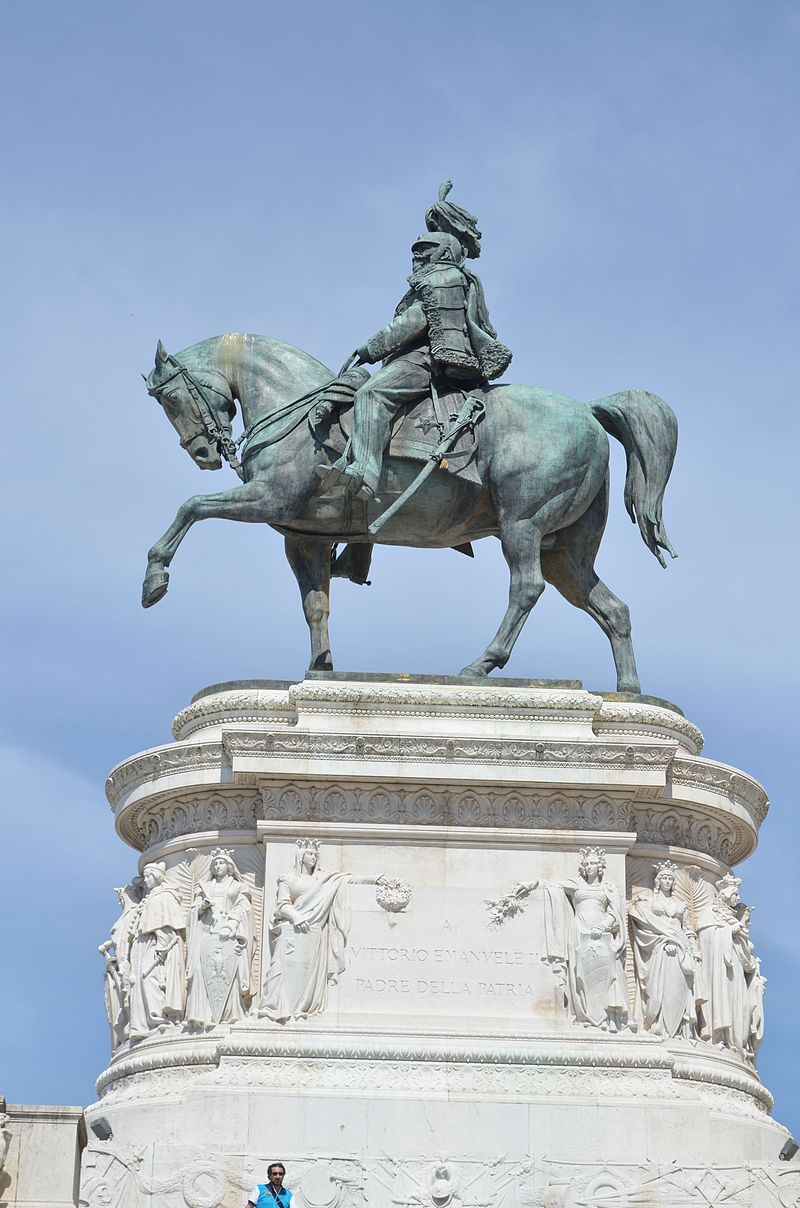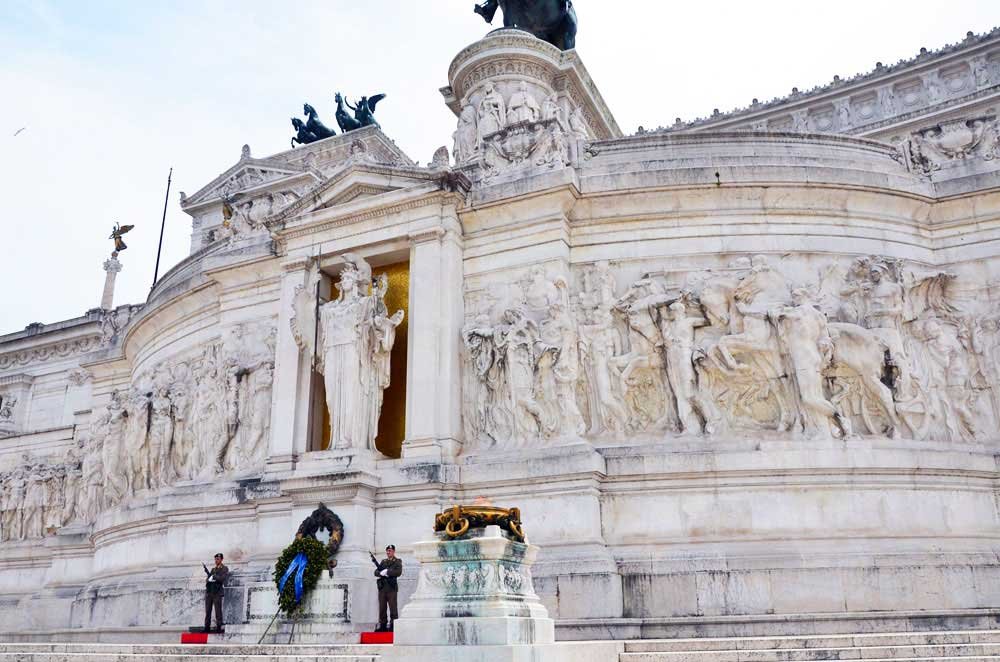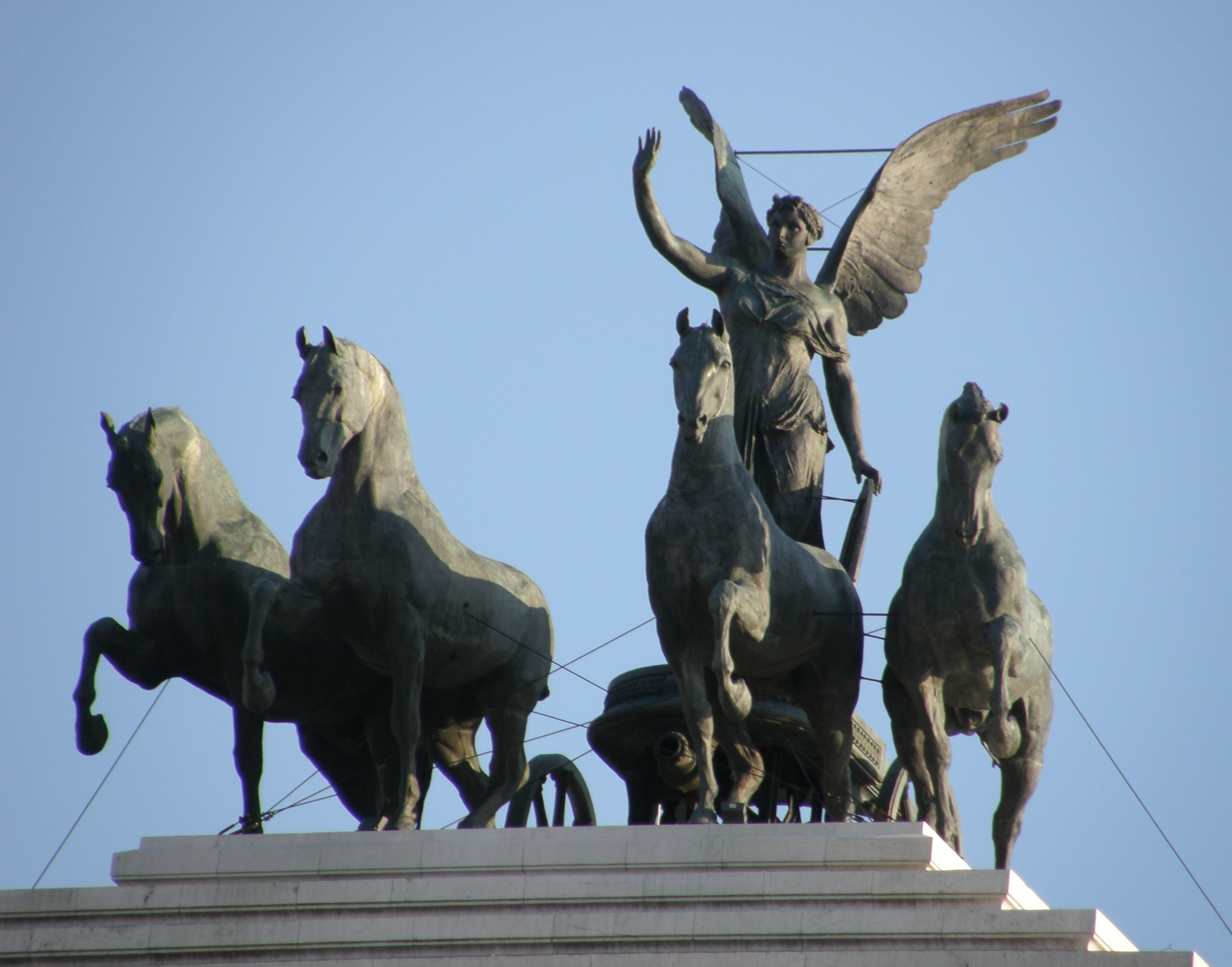
The Quadriga Equestrian statue, Figurative sculpture, Sculpture
The Altare della Patria is a symbolic connection between ancient and modern. Everybody Loves Altare della Patria - Except Romans. To commemorate Vittorio Emanuele II and the unification of Italy, multiple buildings were demolished, and an immense monument was erected, obstructing the view of the Roman Forum and Colosseum from Piazza Venezia. In its place, a majestic monument crafted from.

Santa Maria Maggiore e il cavallo dell'altare della Patria visto dal
Il Monumento nazionale a Vittorio Emanuele II o (mole del) Vittoriano, chiamato per sineddoche Altare della Patria, è un monumento nazionale italiano situato a Roma, in piazza Venezia, sul versante settentrionale del colle del Campidoglio, opera dell'architetto Giuseppe Sacconi. È situato al centro della Roma antica e collegato a quella moderna.

altare della patria
Altare della Patria: Biglietti, Visite Guidate del Vittoriano e la storia Lascia un commento Visitare l'Altare della Patria insieme alla tomba del milite ignoto ed il Complesso Monumentale del Vittoriano, significa venire a contatto con la maestosità di Roma capitale d'Italia.

Il pranzo nel cavallo dell'Altare della Patria Prometeo Magazine
4.1K. All you need to know about the Vittoriano, Rome: how to visit, facts and practical info about one of Rome's most peculiar monuments. Il Vittoriano, Monumento a Vittorio Emanuele II, or Altare della Patria (Altar to the Fatherland) is one of the most distinctive and controversial monuments in Rome.. It is a large neoclassical, big white building towering above Piazza Venezia, in Rome.

Equestrian Statue at Altare della Patria, in Rome, Italy Encircle Photos
The Altare della Patria, also known in English as the Altar of the Fatherland, or Vittoriano, is a monument in Rome built in honor of Victor Emmanuel II, the first king of Italy.The Vittoriano is located on the Capitoline Hill, along with other important monuments of the Ancient Rome Area such as the Colosseum and the Roman Forums, overlooking the stunning Piazza Venezia.

The Quadriga of Unity of Victor Emmanuel in Piazza Venezia in Rome in
RMGNJCA3 - The window that Benito Mussolini used to give his speeches from near Altare della Patria, Rome, Italy RM DNX219 - June 15, 1938 - Rome, Italy - BENITO MUSSOLINI (1883-1945) the Italian dictator and leader of the Fascist movement, riding horseback.

Winged Victory and Quadriga Altare Della Patria Rome Italy Stock
LE FOTOGRAFIE CHE HANNO FATTO LA STORIA Home » La cena nel cavallo del Vittoriale La cena nel cavallo del Vittoriale Vittoriano, Altare della Patria, Monumento al milite ignoto o per gli abitanti di Roma, la "Macchina da scrivere" per la somiglianza con lo strumento di giornalisti e scrittori ormai oggi dimenticato.

L'altare della patria in una bellissima foto di romaierioggi Foto
Altare della Patria Inaugurated in 1911 to pay respect to Victor Emmanuel II, the Monumento Nazionale a Vittorio Emanuele II (Altare della Patria) is an imposing building located in Piazza Venezia . It provides some breath-taking views of Rome.

Equestrian Statue Of Vittorio Emanuele II Monument Vittoriano Or
Denominazione del monumento a Vittorio Emanuele II eretto a Roma, sul fianco del Campidoglio (1885-1911) su disegno di G. Sacconi per celebrare l'unità d'Italia. È costituito da una larga scalinata, che conduce al primo ripiano, dov'è situato l'Altare della Patria con la tomba del Milite Ignoto (la Statua di Roma al di sopra della tomba e i due altorilievi ai lati con i Cortei del lavoro e.

Altare della Patria informazioni utili e una curiosità di certo non sapevi
scopri la storia Cosa vedere scopri cosa vedere Da non perdere Il sito ufficiale del Vittoriano di Roma, Il più importante monumento al primo re d'Italia, Vittorio Emanuele II, simbolo della nazione e dei suoi valori.

Equestrian Statue of Marcus Aurelius, Piazza Del Campidoglio
The bronze statue of King Vittorio Emanuele standing proudly in the center of the Altare della Patria is 12-foot tall, standing atop a podium of 40-foot. The horse-and-rider statue is, in fact, so large that it had to be cast in 13 separate pieces. When the casting was finished, a celebratory dinner was held in the horse's stomach to celebrate.

Altare della Patria. Now this is absolutely my favourite place of the
Vittoriano, Altare della Patria, Monumento al milite ignoto o per gli abitanti di Roma, la "Macchina da scrivere" per la somiglianza con lo strumento di giornalisti e scrittori ormai oggi dimenticato. Sul monumento campeggia un cavallo, enorme, come il re che porta in groppa. La figura del cavallo è grande 16 volte quella naturale.

ROMA “IL VITTORIANO” MONUMENTO A VITTORIO EMANUELE II DI SAVOIA >> »
The colonnade. The Monument to Victor Emanuel II, also known as 'Il Vittoriano' and sometimes also referred to as the Altare della Patria (Altar of the Nation), is a bombastic monument built with sparkling white marble from Botticino in the province of Brescia. It is decorated with numerous allegorical statues, reliefs and murals, created.

Equestrian Statue of Vittorio Emanuele, Altare Della Patria, Piazza
To visit the panoramic terrace of the Altare della Patria, you must purchase Victor Emmanuel ii monument tickets. This ticket also includes entry to the Museum of the Risorgimento, as well as the museum at Palazzo Venezia just adjacent to the monument in Piazza Venezia. 2€ - Everyone 18-25.
Romapoint L'Altare della Patria e la statua di Vittorio Emanuele II
La costruzione dell'altare della patria è iniziata nel 1885 con Umberto I di Savoia, figlio di Vittorio Emanuele II, primo re d'Italia. La necessità era quella di avere un monumento commemorativo estremamente simbolico per testimoniare i cambiamenti che il Paese stava vivendo.

Equestrian Statue at Altare della Patria Rome, Itlay In the Limelight
The location of the Altare della Patria is also full of meaning. Ever since Rome's foundation, the hill has been as a symbol of the greatness of the city.. At the end of the 19th century, the decision was made to demolish many of the remains on Capitoline Hill to make room for the imposing monument, a project designed by architect Giuseppe Sacconi dating back to 1885 - 1911.